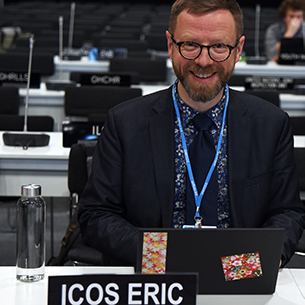
To celebrate Dr. Emmanuel Salmon continuing as the head of Strategy and International Cooperation (SIC) at ICOS ERIC we wish to highlight the important role the SIC unit plays to help ICOS continue to grow as a key organisation in global climate research and policy.
The SIC unit was established in 2019 to increase the impact of ICOS through building bridges and developing contacts with other research organisations. In order to address a global challenge such as climate change, it is necessary to have a global response. However, no single research organisation has the global coverage and the ability to, for example, observe greenhouse gas concentrations over the whole globe. It is therefore crucial for ICOS, who is the leading Research Infrastructure in Europe, to establish close contacts with similar organisations in other regions of the world and cooperate with them to provide the necessary scientific basis to combat climate change.
One way the SIC unit improves the impact of ICOS is through translating the scientific knowledge into information that policy makers can use when they make decisions. “It is a hard task, and not only because policy-makers would not listen, but often because we are not able to understand their needs and their constraints,” states Dr Salmon. “This is an area where we still have room for improvement,” he adds.
Establishing trust is the key for international relations as cooperation cannot be achieved if the involved parties do not trust that their goals match. “I don’t see international relations as a game with a winner and a loser,” says Dr Salmon, “it is always possible to identify an area, an issue, out of which both parts can create mutual benefits.”
In terms of goals for the future, growing the geographical coverage of ICOS activities is scientifically important. As a Research Infrastructure, ICOS was designed to cover the European continent and while ICOS stations can be found in some of the most remote corners of the continent, attracting new countries into the ICOS network is a key objective. “I am really happy to see Spain joining us this year as the first of, I hope, a long series of countries,” says Dr Salmon.
Regarding collaborations worldwide, Dr Salmon sees two major objectives: To reinforce the contacts with partners in Asia and especially with Japan, in order to learn from their way of coordinating climate observation activities; and to support colleagues in regions of the world where ground-based earth observations are still scarce. “We have started this dialogue with African partners and would certainly benefit from similar efforts in South America,” says Dr Salmon.
The significance of the work of Dr Salmon and colleagues was clearly recognised when ICOS was admitted as an Observer to the United Nations Framework Convention on Climate Change (UNFCCC) in 2019. The high-quality ground-based measurements of greenhouse gases provided by ICOS form the basis of excellent science and are a vital tool to support national strategies on climate action and to strengthen emission reporting by countries. “My efforts to promote ICOS internationally rely on the achievements of my colleagues” says Dr Salmon.